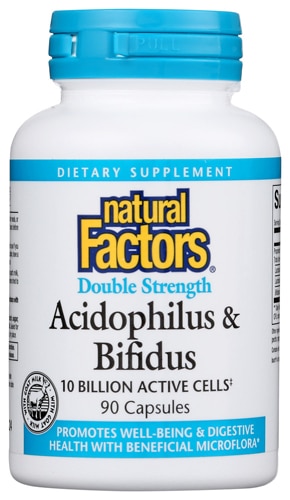Natural Factors Acidophilus and Bifidus Description
-
Promotes Well-Being & Digestive Health with Beneficial Micro-Flora
L. rhamnosus is probably the most important probiotic strain for health from the mouth to the small intestine. It protects by coating the mucus, preventing toxins from reaching the blood. It even results in better smelling breath. L. rhamnosus survives temperature extremes and is resistant to bile salts and stomach acid, ferments 23 sugars and inhibits negative bacteria and yeast growth. It is hardier and keeps better without refrigeration.
Compared to L. acidophilus, L. rhamnosus is 8 to 10 times more prolific, has a larger spectrum of sugar fermentation (important for people with milk sugar intolerance), has better control over putrefactive microbes, and is more effective at inhibiting disease-causing pathogens.
L. acidophilus produces lactic acid which keeps a proper pH balance in the small intestine, inhibiting yeast growth. Studies have shown that L. acidophilus is effective in reducing lactose intolerance, inhibiting undesirable organisms in the intestine, reducing cholesterol levels and controlling diarrhea.
B. bifidus helps maintain health of the large intestine in both children and adults, promoting regular bowel movements, giving protection from yeast and bacterial pathogens such as E. coli, Clostridium and Shigella infections.
Goat milk is an excellent environment for lactic bacteria because it helps beneficial bacteria proliferate. It also lacks a specific protein that is found in cow milk to which many people are allergic.
To maintain healthful intestinal flora, take 1 capsule 1-3 times per day, preferably 30 minutes after meals. When taking antibiotics, wait two hours before ingesting.
For maximum potency, refrigerate.
*These statements have not been evaluated by the Food and Drug Administration. This product is not intended to diagnose, treat, cure, or prevent any disease.
| Amount Per Serving | % Daily Value | |
| Total Active Cell Count | 10 billion | * |
| L. rhamnosus | 8 billion | * |
| L Acidophilus | 1 billion | * |
| B. bifidum | 1 billion | * |



